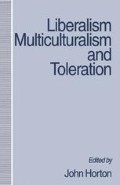Abstract
All modern liberal democratic societies are marked by diversity and difference — differences of ethnicity, culture and religion in addition to the many individual differences which characterise the members of such societies. Traditionally liberalism has been pictured as celebrating much of this diversity, or as at least tolerant of many differences which might not be thought valuable. Yet it has become clear that the relationship between liberalism, pluralism, especially multiculturalism, and toleration is much more problematic than this simple and comforting picture suggests. In particular, while not a new problem, it has become an increasingly urgent issue of theory and practice as to how tolerant liberalism is, or can be, of cultural and religious groups which do not themselves subscribe unreservedly or without qualification to what have been taken to be the basic values of liberalism.
Access this chapter
Tax calculation will be finalised at checkout
Purchases are for personal use only
Preview
Unable to display preview. Download preview PDF.
Notes
See Robert Nozick, Anarchy, State and Utopia. (Oxford: Blackwell, 1974)
Ronald Dworkin, A Matter of Principle. (Cambridge, Mass.: Harvard University Press, 1985)
Bruce Ackerman, Social Justice in the Liberal State. (New Haven: Yale 17 University Press, 1980), Part Three
Joseph Raz, The Morality of Freedom., (Oxford: Clarendon Press, 1986).
His magnum opus. is John Rawls, A Theory of Justice. (Oxford: Oxford University Press, 1971).
It is perhaps significant that while the philosophical literature on pluralism is extensive very little exists devoted explicitly to multiculturalism. It seems that multiculturalism has mostly achieved popularity with educationists. For a useful and wide-ranging discussion see S. Modgil, G.K. Verma, K. Mallick and C. Modgil (eds) Multi-Cultural Education: The Interminable Debate. (London: Falmer Press, 1986).
These and other relevant issues are very interestingly discussed in Bhikhu Parekh, ‘Britain and the Social Logic of Pluralism’ in Britain: A Plural Society. (London: Commission for Racial Equality, 1990).
For a helpful discussion of the relationship between liberalism and toleration see Susan Mendus, Toleration and the Limits of Liberalism. (London: Macmillan, 1989).
Steven Lukes, Moral Conflict and Politics. (Oxford: Clarendon Press, 1991), p. 17.
This discussion of toleration draws on my ‘Toleration’ in David Miller (ed.), The Blackwell Encyclopaedia of Political Thought. (Oxford: Blackwell, 1987).
See Nozick, op. cit. and Will Kymlicka, Liberalism, Community and Culture. (Oxford: Oxford University Press, 1989).
See for example Eric Barendt, Freedom of Speech. (Oxford: Clarendon Press, 1987).
Editor information
Editors and Affiliations
Copyright information
© 1993 John Horton
About this chapter
Cite this chapter
Horton, J. (1993). Liberalism, Multiculturalism and Toleration. In: Horton, J. (eds) Liberalism, Multiculturalism and Toleration. Palgrave Macmillan, London. https://doi.org/10.1007/978-1-349-22887-4_1
Download citation
DOI: https://doi.org/10.1007/978-1-349-22887-4_1
Publisher Name: Palgrave Macmillan, London
Print ISBN: 978-1-349-22889-8
Online ISBN: 978-1-349-22887-4
eBook Packages: Palgrave Political & Intern. Studies CollectionPolitical Science and International Studies (R0)

